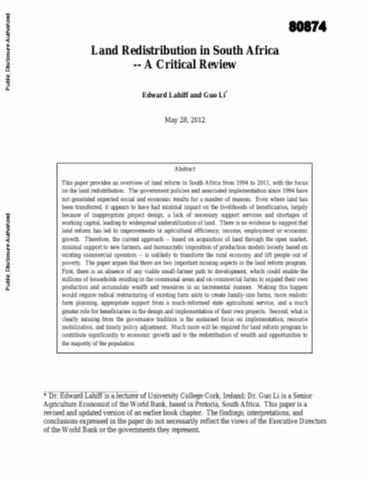Resource information
This paper provides an overview of land reform in South Africa from 1994 to 2011, with the focus on the land redistribution. The government policies and associated implementation since 1994 have not generated expected social and economic results for a number of reasons. Even where land has been transferred, it appears to have had minimal impact on the livelihoods of beneficiaries, largely because of inappropriate project design, a lack of necessary support services and shortages of working capital, leading to widespread underutilization of land. There is no evidence to suggest that land reform has led to improvements in agricultural efficiency, income, employment or economic growth. Therefore, the current approach, based on acquisition of land through the open market, minimal support to new farmers, and bureaucratic imposition of production models loosely based on existing commercial operators, is unlikely to transform the rural economy and lift people out of poverty. The paper argues that there are two important missing aspects in the land reform program. First, there is an absence of any viable small-farmer path to development, which could enable the millions of households residing in the communal areas and on commercial farms to expand their own production and accumulate wealth and resources in an incremental manner. Making this happen would require radical restructuring of existing farm units to create family-size farms, more realistic farm planning, appropriate support from a much-reformed state agricultural service, and a much greater role for beneficiaries in the design and implementation of their own projects. Second, what is clearly missing from the governance tradition is the sustained focus on implementation, resource mobilization, and timely policy adjustment. Much more will be required for land reform program to contribute significantly to economic growth and to the redistribution of wealth and opportunities to the majority of the population.


